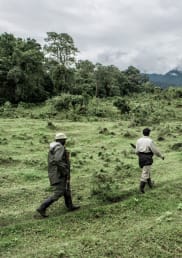Entitlement collapse and the politics of the belly in the Philippines
Entitlement collapse is spreading in the Bangsamoro and in other poverty-stricken urban poor settlements in primary urban areas in the country.
People have lost the means that “entitle” them to secure their food and other basic needs. The prolonged pandemic has diminished their capabilities and opportunities to earn a living. They possess few other assets like land to use or sell to grow or buy food. Their labor endowment encounters no market demand.
n the Philippine setting, this normally comes during agricultural lean months just before the arrival of the main season rice crop in October, when belts are tighter, and stomachs are wanting.
This year hunger arrived early.
International Alert Philippines‘ critical events monitoring recorded instances of palay harvests being stolen from the fields of Bataan in the north to Maguindanao in the south. There are growing reports of violence linked to cattle rustling, smuggling, and robberies—the same sort of incidents that often occurred just before the start of the school season and the onset of harvest. Security is being beefed up in many areas where food stockpiles are located.
Reports from Alert’s early response teams validate the seriousness of the situation in the Bangsamoro and in the urban enclaves beyond Mindanao. The problem is not shortage of food stocks but an inability to buy these stocks. People without a wage means stockpiles with no buyers.
Farm workers in the agricultural sector lost their jobs when large agribusiness plantations ceased operations. The unemployed and underemployed—especially the youth—are being lured into the informal sector, mostly in coping economies, but a significant other into deadly economies in illegal drugs and guns.
The advent of Ramadhan in April is being met with a mix of relief and apprehension—the former because Ramadhan is a period for self-improvement and the celebration of family, but the latter too because tensions are rising among the impoverished who have taken to fasting ahead of the holy month, with no income to speak of.
It is clear that the conditions faced by the poor are getting more hostile. What makes it worst is that subsidies can no longer be sustained by a government saddled with debt and deficits, hard pressed to find a source for the same subsidies that plugged hunger in the first half year of the pandemic. Graver still is that any cash infusion to help local governments cope stands the very real chance of being diverted towards amassing a war chest for vote buying and campaigning ahead of the 2022 elections.
Early, coordinated, and collective response can prevent violent flashpoints if leaders are conscious about the same politics of the belly that visited our Southeast Asian neighbours Indonesia and parts of Malaysia with their history of food riots and indiscriminate looting. The pandemic surfaced new priorities and approaches that should guide the national and local governments and the private sector in sequencing responses that march in step with periods of great pressure and stress.
But there is hope in the face of all the bad news. Counterpoint narratives on the embedded reciprocity and kindness in many rural communities still resonate, where the moral economy of generosity and caring remains very much alive.
Dr. Aris Alip, Ramon Magsaysay Award winner and President of the biggest micro-lending organization in the Philippines extols the many acts of kindness he continues to see among poor women borrowers who took it upon themselves to help their disadvantaged neighbors. Although he laments that he has seen very little of this behavior in the metropolis where the threat of hunger and the anger it brings remain very real.
Let us hope that our collective sense of goodness, fairness, and justice as Filipinos will be enough to weather the storm ahead.
This op-ed was originally published on the Philippine Daily Inquirer. Teaser image courtesy of Wamploid Cthulhuloid (CC BY 2.0).



